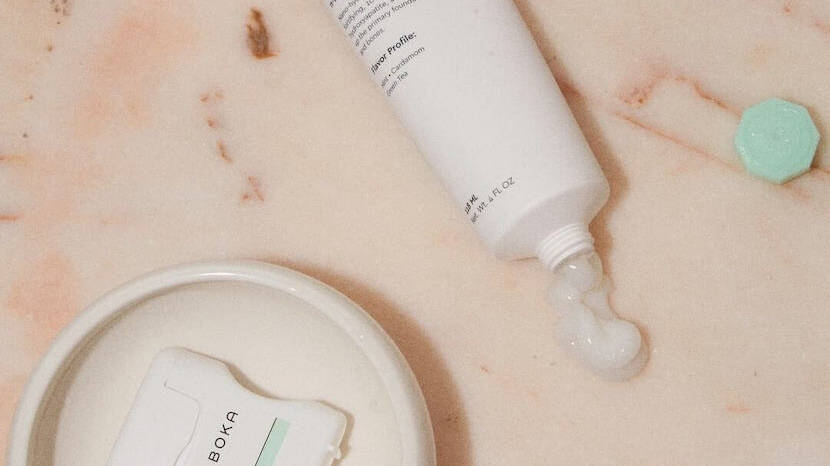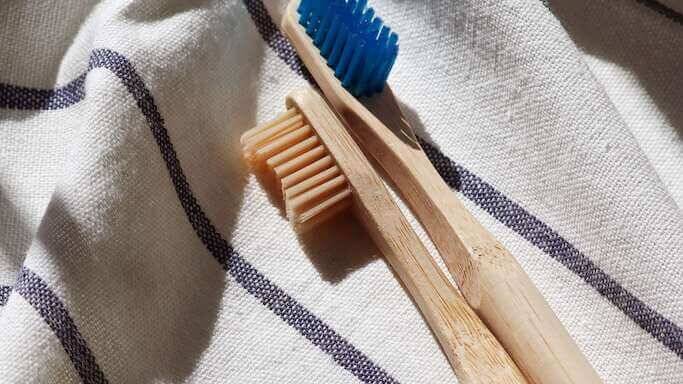I love everything natural and non-toxic, and that’s why I made the switch to fluoride-free. But after a recent visit from my dentist, I did a little digging behind the fluoride-free phenomenon. And I started wondering, was the swap necessary?
About 3 years ago, I switched to everything fluoride-free — my toothpaste, mouthwash, and floss. I even got my family members to join the club. But when I mentioned this at my 6-month check-up at the dentist’s office, eyes started to bulge. Even though everything looked great, no cavities in-sight, she insisted I use fluoride because of all its benefits. I could tell the dental hygienist thought I was out of my mind for skipping it (kind of how I feel about people who think climate change isn’t real).
To understand the big fluoride debate, let’s first unravel fluoride, its benefits, and drawbacks.

Yay for Fluoride: Fluoride is scientifically proven to restore and remineralize enamel. Topical fluoride — the kind in your toothpaste and mouthwash — gets absorbed through your teeth. This attracts minerals that harden your enamel and form a strong acid-resistant barrier to protect your teeth against cavities.
Nay for Fluoride: Yes, it’s true fluoride fights against cavities when applied directly to the teeth. But, it may be unnecessary to add it to our drinking water. Because cavities have decreased in countries with and without water fluoridation, we can’t say that adding fluoride to our water is essential for healthy teeth. Plus, fluoride doesn’t exist naturally in our bodies and is actually dangerous in high concentrations. If you are exposed to high levels of fluoride, there are potential side effects like fluorosis — creates white spots and staining on tooth enamel. Even more so, it can collect on bones, altering the tissue’s structure and weakening the skeleton. And maybe the scariest; research suggests that high levels of fluoride may be toxic to our brain and nerve cells and have identified possible links to learning, memory, and cognition deficits.
Considering I’ve had multiple cavities when I used fluoride dental products, and haven’t had any since switching to fluoride-free (knock on wood), I am still unsure about fluoride. These are the alternatives and preventive tips I’ve found.
Nano-hydroxyapatite (nHa)
A mineral invented by NASA that mimics our natural enamel. Since it’s biocompatible, it’s believed to be non-toxic and won’t contribute to toxic grey water waste like fluoride. It’s scientifically proven to be restorative and prevent cavities more safely and effectively. The brand I use — Boka — even helps with teeth sensitivity.

use code
CADACONSULT
Xylitol
Tooth decay is caused by oral bacteria that fuels plaque production. Unlike sugar, xylitol, a plant-derived sweetener, works against this bacteria. Xylitol fights cavity-causing bacteria from sticking to your teeth while simultaneously unharming friendly bacteria. It also is believed to increase the absorption of calcium, a vital nutrient for strengthening your teeth. Some kinds of toothpaste that include this ingredient are:

- Nourishment
Sugary drinks and foods like soda and hard, sticky candies, are infamously known for causing cavities. It’s because the bacteria in our mouths feed off these sugars, releasing acids that weaken the enamel and sadly lead to tooth decay. Processed carbohydrates like bread, sticky dried fruits, starchy potato chips, saliva-stopping alcoholic drinks, and solid ice also make the list of worst things for your pearly whites. But good news, foods rich in calcium and phosphorus protect and rebuild tooth enamel. Here are some foods that can help heal your mouth:
- Leafy greens
- Almonds
- Protein-rich foods like lima beans and broccoli
Flossing and Tongue Scraping
It’s time to rethink your daily dental routine. If you don’t already, start flossing daily and swap alcohol-based mouthwash for a metal tongue scraper.
Only 30% of people living in the United States floss daily. These daily-flossers are living their best lives! Flossing lets them get in between their teeth, where bacteria hide and is missed by brushing alone. By doing this, their teeth instantly look brighter and feel fresher.
Metal tongue scrapers also help freshen your breath by removing built-up bacteria off your tongue. Mouthwash works to dissolve this bacteria while tongue scrapers physically remove it — proving to be much more effective. The white layer of bacteria (that is to blame for serious morning breath) can also wreak havoc on your overall health. So, it’s best to remove it from your mouth before you swallow it.

@weheartit
- With all that being said, I don’t regret making the switch to fluoride-free toothpaste because I have a more holistic understanding of my oral health. However, this may not be what’s best for you. As such, it’s important to do what makes you feel healthy and consult with your doctor.

